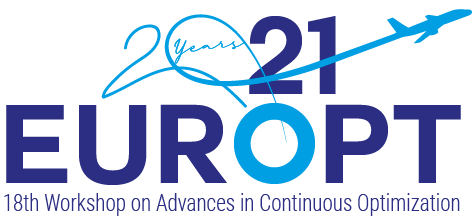TA-03: Game theory, multilevel and dynamic optimization I
Stream: Variational inequalities, Nash games, game theory, multilevel and dynamic optimization
Room: Nash
Chair(s): Mathias Staudigl
Consistent Multiscale Control of Stackelberg Games
Anna Thünen
We present a Stackelberg game with a large number of followers and we also derive the mean field limit of infinitely many followers. The relation between optimization and mean-field limit is studied and conditions for consistency are established. Finally, we propose a numerical method based on the derived models and present numerical results.
Approximation and exact penalization in hierarchical programming
Giancarlo Bigi, Lorenzo Lampariello, Simone Sagratella
Hierarchical programs are optimization problems whose feasible set is the solution set of another problem. The talk focuses on lower-level problems that are non-parametric wrt upper level variables: minimization over the solution set of a variational inequality is considered, which is a peculiar semi-infinite program and encompasses simple bilevel and equilibrium selection problems. To tackle it, a suitable approximated version is introduced. This does not perturb the original program too much while allowing the exploitation of exact penalty approaches whose convergence properties are shown.
Generalized Nash games with discontinuous cost functions: an new approach
Didier Aussel, David Salas, Kien Cao Van
A generalized Nash equilibrium problem (GNEP) corresponds to a non cooperative interaction between a finite set of players in which the cost function and the feasible set of each player depend on the decisions of the other players. The classical existence result for generalized equilibria due to Arrow-Debreu requires continuity of the cost functions. In this work, we provide an existence of solutions transferring this hypothesis to a “continuity-like” condition over the sublevel sets of the aforementioned functions. Comparison with Reny’s approach for discontinuous games is also considered.
Qualitative stability for solution map of parameterized Nash equilibrium problem and application
Thanh Cong Lai Nguyen, Didier Aussel
It is well known that the Nash Equilibrium Problem is a multi-player model of non-cooperative games. It is of interest to know whether the solution set of its parameterized form is stable or not. Here stability is understood in the sense of the semicontinuity of the solution set-valued map. We explore a number of different approaches based on either product-type assumptions or componentwise hypotheses. The qualitative stability is investigated under some properties such as semicontinuity, quasiconvexity of the cost functions of the players. Then application to single-leader-multi-follower
